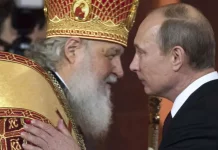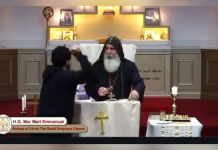
When the Global South Fellowship of Anglican Churches announced their momentous decision to split from Canterbury on 21st February, the sting was in the tail. The bishops, including those from Nigeria, Uganda South Sudan, said they would not quit the Anglican Communion but that they could no longer be in communion with the Church of England as a “revisionist province … whose decision goes against the overwhelming mind of the Anglican Communion”, thus relegating the Church of England to the margins, as they see it, of the Communion. They also pledged to provide Bishops to support any Church of England dioceses or groups who opposed blessings for same sex couples.
The decision seems massive but there were warning signs aplenty. Global South Fellowship had already broken off relations with the USA, Canada, New Zealand, Scotland and Wales over the earlier decisions in these provinces to offer church weddings and blessings to same sex couples, and relations with Canterbury were already hanging by a thread.
How did we get here? The case of Tim Farron is instructive. Although he is still MP for Westmorland and Lonsdale, he keeps himself to himself these days after being pressured into standing down as leader of the Liberal Democrats due to a backlash over his views regarding gay sex, thus sacrificing his political career on the altar of his belief, as some would see it.
We can now see that the “Tim Farron effect” might have scuppered Kate Forbes, the evangelical Christian who narrowly lost out to Humza Yousaf in the contest to replace Nicola Sturgeon as leader of the SNP, though whether this was specifically due to her stance on gay marriage is unclear.
But to understand how illiberal liberals and Liberals must seem to those who take a conservative position on these matters, we need to see things from a wider perspective. It’s as if the Anglican Communion in Western Europe and some parts of the global north is collectively looking at things through the wrong end of a telescope. Let us be clear, they are the outliers in this matter. There is a large and growing number of Anglicans in Africa and the global south, the great majority of whom do not understand the relentless discussions among Western Anglicans about same sex marriage. Why is this?
According to Chris Wadibia, Research Fellow at Pembroke College Oxford and former Woolf Institute scholar, African Anglicans regard these discussions as basically secular in origin and something approaching a recent fad. But more importantly, by trying to table these ideas, Western Anglicans are perceived as echoing the behaviour of past colonial missionaries.
Back then the message was against African forms of polygamy. Now the message is acceptance of same sex marriage into mainstream liturgy. The message has changed radically but it is still received as un-African. Perceived modern colonialism, in the guise of exported progressive liberalism, is being rejected on the basis that older values are still preferred.
Postcolonial tensions between Communions in the West and Global South were, perhaps, rather inevitable. Indeed, it’s surprising just how fertile African soils have been, not just to Anglicanism, but to Christianity across the board. Islam too has flourished, but it did not come with a colonial “badge”. For Chris Wadibia this is crucial: “As an African you cannot go along with this potential imposition [of liberal values] without characterizing yourself as a neo colonial actor”. He adds that it does not follow that that a majority of African Anglicans would go along with the idea of criminalizing gay sex, as has happened in Nigeria and Uganda.
The Global South Fellowship represents 75% of Anglicans worldwide and it is perhaps with mandate in mind that the General Synod reached the doomed compromise conclusion it did. Hailed by some as holding a creative tension between denying formal ritual to same sex marriage while tolerating homosexual love, it was ultimately construed as a fudge. On a practical level, it opened the door to a second-class form of life partnership which did not satisfy gay Anglicans.
In retrospect this could have accounted for Archbishop Welby’s personal decision not to give blessing to same sex civil marriages. But the deep distress he obviously felt at the end of the Synod seemed to indicate that his decision was born of deep feeling not of realpolitik calculation.
The Woolf Institute has recently published a ‘Gender and Society’ podcast in their Naked Reflections series in which a gay Muslim activist Shannon Shah and an Orthodox Jewish scholar Lea Taragin-Zeller discuss the Patriarchy and the heterosexually normative assumptions that underpin the Abrahamic faiths. It’s worth a listen.
Where should Anglicans go from here? There are no easy answers but it may be worth reflecting on the fact that whatever your views on same sex marriage and gay sex, the focus on these matters does sometimes seem disproportionate given all the problems facing the Anglican Communion and the World. Another General Synod, another agonized debate about same-sex marriage and homosexual love. Groundhog Synod? It must have felt like that to some conservatives.









